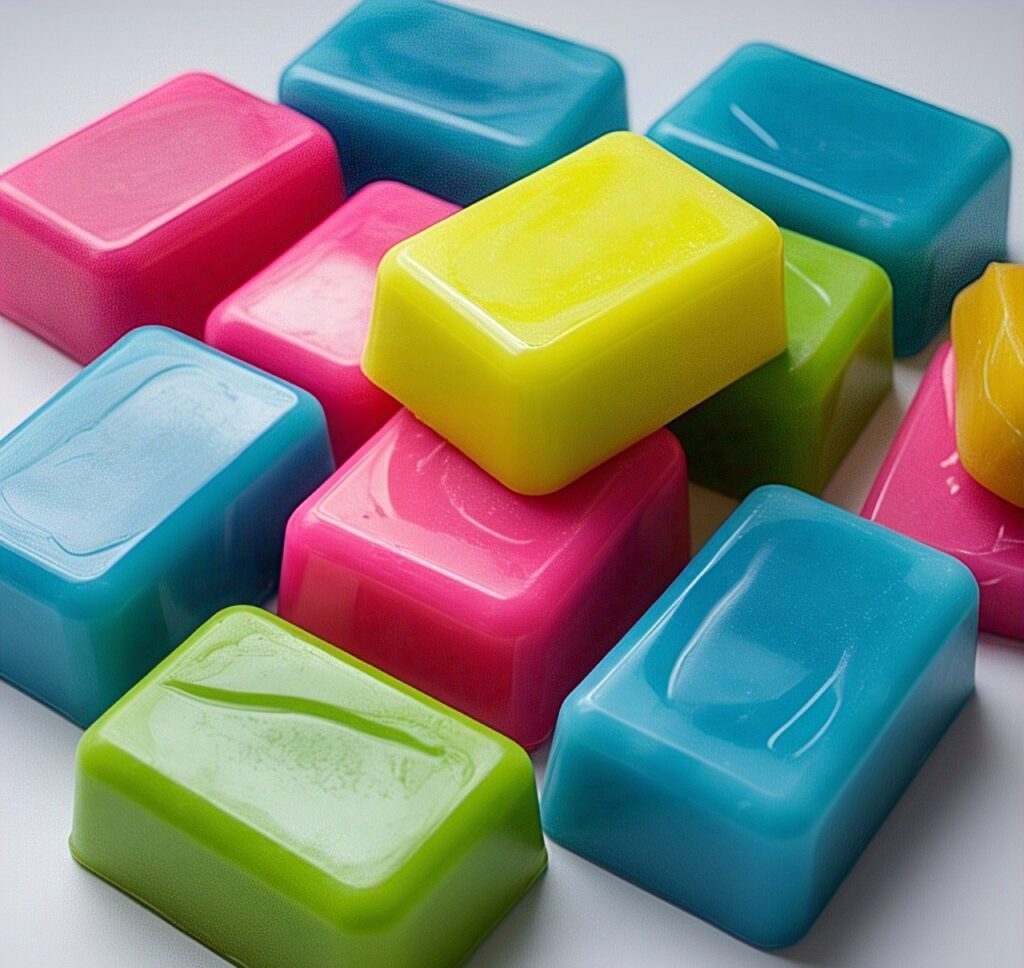What Are Synthetic Soaps?
Have you ever wondered what exactly is in your everyday synthetic soap bar? The answer might surprise you.
Synthetic soaps are not traditional soaps made through the classic saponification of fats and lye. Instead, they are primarily composed of synthetic detergents (or syndets), which are man-made chemical compounds developed for cleansing purposes.

These soaps are widely used in commercial body washes, facial cleansers, shampoos, and even antibacterial bars. While they might feel and smell great, synthetic soaps are part of a much larger story of chemistry, convenience, and consumer demand.
How Are Synthetic Soaps Made?
Unlike cold process or traditional soaps, synthetic soaps are made using:
- Surfactants like sodium lauryl sulfate (SLS), sodium laureth sulfate (SLES), and cocamidopropyl betaine.
- Preservatives to extend shelf life.
- Fragrances (often synthetic).
- Colorants and thickeners.
These ingredients are synthesized through industrial chemical processes, often starting with petroleum derivatives or plant-based oils modified in laboratories.
Why Are Synthetic Soaps So Popular?
There are practical reasons why synthetic soaps have become household staples:
- Cost-effective: Mass production makes them cheaper.
- Long shelf life: Preservatives prevent spoilage.
- Consistent quality: Controlled chemical formulation ensures uniformity.
- Customizable: Easy to add scents, colors, and textures.

Synthetic Soaps vs. Natural Soaps
| Feature | Synthetic Soaps | Natural Soaps (e.g., cold process) |
|---|---|---|
| Main Ingredients | Lab-made surfactants | Natural oils + lye |
| pH Level | Lower (less alkaline) | Higher (more alkaline) |
| Environmental Impact | Often non-biodegradable | Typically biodegradable |
| Skin Sensitivity | May cause irritation | Gentler on sensitive skin |
| Preservatives | Required | Often not needed |
| Antibacterial Additives | Common | Rare, unless using essential oils |
Are Synthetic Soaps Bad for You?
Not necessarily. But there are caveats:
Pros
- Gentler pH: Less likely to disrupt the skin’s acid mantle.
- Effective Cleansing: Surfactants remove oil and dirt efficiently.
Cons
- Irritants: SLS and similar surfactants can dry or irritate sensitive skin.
- Fragrance Allergies: Synthetic fragrances are common allergens.
- Environmental Concerns: Non-biodegradable ingredients can harm aquatic life.
“Not all synthetic ingredients are harmful, but lack of transparency in labeling can make it difficult for consumers to make informed choices.” — Dermatology Times
What to Look for in Synthetic Soap Labels
If you do use synthetic soaps, it’s worth checking the label. Look for:

- SLS/SLES-Free: Gentler options.
- Paraben-Free: Avoiding certain preservatives.
- Dermatologist-Tested: Especially if you have sensitive skin.
- Cruelty-Free & Vegan: For ethical manufacturing standards.
When Should You Avoid Synthetic Soaps?
You might want to switch to natural or artisan soaps if you:
- Have eczema, rosacea, or sensitive skin.
- Are concerned about sustainability.
- Prefer fewer chemicals and more natural living.
Are There Any Good Synthetic Soap Brands?
Yes! Some brands have reformulated their products to be both effective and gentle.
Please add in the comments below!
Final Thought: Should You Use Synthetic Soaps?
There’s no one-size-fits-all answer.
If convenience, affordability, and effective cleaning matter most, synthetic soaps are perfectly fine — especially if you choose brands with clean, transparent ingredient lists.
However, if your skin reacts badly to synthetic ingredients, or you care deeply about environmental sustainability, switching to natural soaps like cold process soap might be worth exploring.
Call to Action
🧼 What’s your experience with synthetic soaps? Love them, tolerate them, or avoid them completely?
👇 Comment below and share your go-to soap brand, especially if you’ve found something that balances skin-friendliness and eco-consciousness!
Related Read: What Is Cold Process Soap and Why It Matters
Tags: synthetic soaps, soap comparison, skin care, eco-friendly living, natural vs synthetic, skin sensitivity



